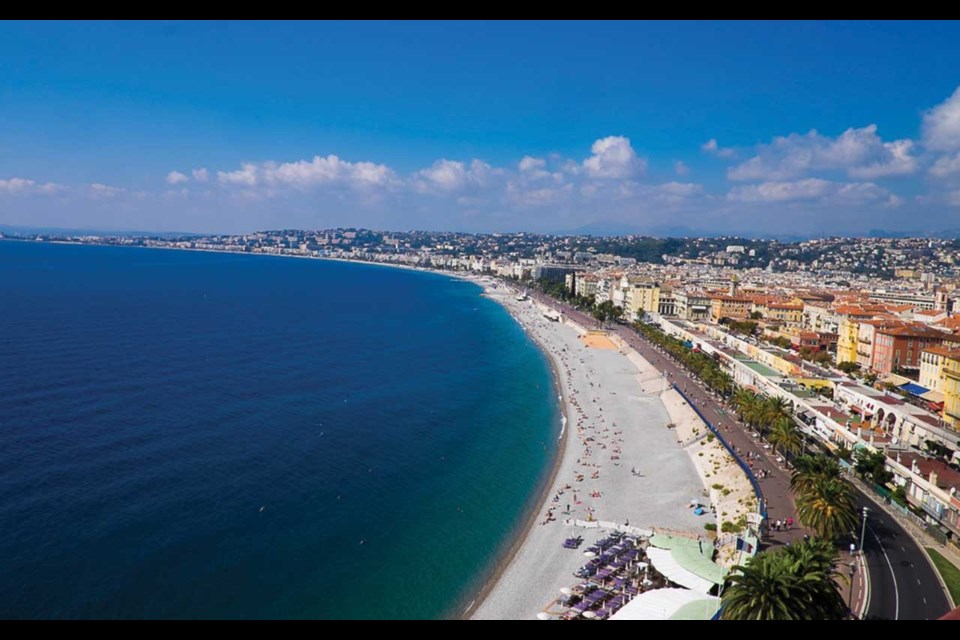When visiting my daughter in Nice, France, I often run my van up Mont Chauve to park for the night overlooking the city and the Mediterranean Sea.
It is a short drive down to walk her to school, pick her up, or go to the park. I have a favoured hairpin curve that offers the longest hours of sunlight before the glorious orb dips behind the mountain, all the while giving up the strongest mobile signal around.
On Thursday, March 12, the French government announced schools would close the following Monday, crowds over 500 were prohibited, people over 70 were recommended to stay home, yet, for some bizarre reason, voting in municipal elections would go ahead Sunday.
We closed school immediately and I spent Friday with my daughter. Around noon, her mom called to request I go to the supermarket for staples as her lunchtime walk revealed shelves in Monaco emptying out. I admired the choices of the senior in front of me (correct physical distancing practiced): a four-year supply of laundry detergent, a six-month supply toilet paper, and bottled water—as if clean drinking water does not flow from the taps. I confess to taking the last five bags of the preferred pasta from the local Bio-Coop.
COVID-19 has had Italy on its knees for weeks, yet the French seemed cavalier as recently as March 14, when the market was packed, and cafes were full of people paying zero attention to social distancing or proper cough/sneeze techniques. And let's not forget the bise—the perfect French double cheek kiss of microbial migration.
I walked the tram tracks, distanced from the mob, snuck to my favourite vegetable vendor, loaded a basket and left out the back. Further up the hill, the clientele in the bakery were joking with the server about her gloves.
"Do you change them for every customer?" asks one. The server feigns to scratch her armpits in reply. Again, no distancing, with 10 people crammed into just over three square metres (35 sq. ft).
A friend of mine at MSF in Geneva recorded an official communique that Switzerland is two to seven days behind France, pleading for everyone to stay home for the weekend and noting the teens and young adults appeared to be "super-carriers." Not surprisingly, that same demographic arrived on the mountain late Saturday afternoon, three cars full, and proceeded to share drinks and joints. Saturday night, the government closed all bars and restaurants.
As Saturday's closures began to sink in, Sunday saw a remarkable number of visits to Mont Chauve, probably more people than voted, as turnout, not surprisingly, was abysmal.
My daughter and I hunkered down Monday, drawing, playing Pirate Attack and making up stories. I walked to the supermarkets but chose not to enter the fray, noting lineups of 50 people and more. By end-of-day, the government had issued new regulations, effective noon Tuesday.
Remaining in Nice on Tuesday, March 17, I watched morning movement reduce to near nothing in the afternoon. The occasional bus buffeted my van, random joggers went around in circles and dog walks were shortened as people are required to stay close to home and—theoretically—carry a signed "Attestation de Deplacement Derogatoire" to justify one of four allowable reasons to be out of the house.
Midday on March 18, I have returned to Mont Chauve where I have become accustomed to sounds of barking dogs and crowing roosters nearby getting drowned out by the din of the city as sirens sound, traffic tangles, horns blare and tempers flare. But this is Day 2 of the French lockdown, barely 24 hours since application of Article 1 of the government decree, March 16, and the animals have the stage.
There is an eerie silence from civilization below and birds create the cacophony in the nearby grasses. Nature has ascended as barking dogs seem loud and, if the crowing is an indicator, the roosters have no idea it is not dawn. Impressive.
Meanwhile, the entire EU has reacted with varying levels of decrees, most borders closed and all but essential travel prohibited. This is a critical moment in history. Time will tell how people react and what happens as there is a fortnight remaining in the French decree.
It is my sincere hope that people will be able to come together (at a distance of two metres) and support each other and those in need. Meanwhile, my daughter is safely in her home and her mother working remotely to isolate while I survey the city from above.
Tim Morch is a chronic traveller who dreams of being a writer when he grows up. Whether in the saddle of a bicycle or motorcycle, the cockpit of a sea kayak, riding a wave or trekking a backcountry trail, Tim has a love of adventure and a passion for discovery. You can learn more about him at timmorch.com.




